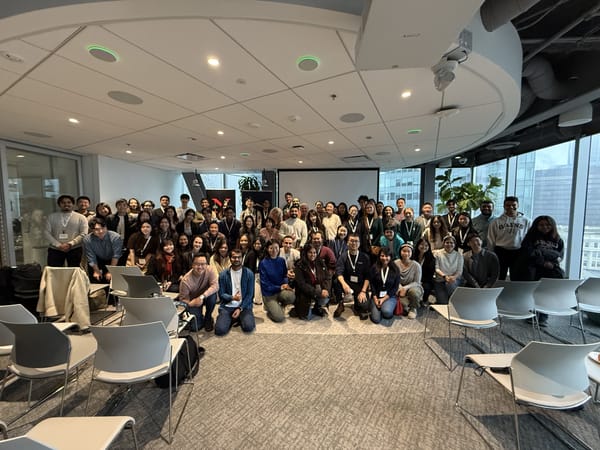How Much Does “Industry Experience” Matter for a Product Manager?

This is a common dilemma for many budding and experienced PMs alike.
This topic is as interesting as it is deep. But it can also introduce more complicated discussions since every person's circumstance is different. Let's explore the importance of domain/industry experience, as opposed to focusing on PM fundamentals in one's career!
Pretend you’re a hiring manager looking for the next PM to help drive your digital finance product. You have two candidates on your radar who have differing profiles, with each featuring their own respective repertoires:
- Product Manager A has 5 years of experience focusing on a previous finance-related business. All years provide a proven record of shipping successful features with solid metric gains, but none which incredibly stand out.
- Product Manager B has 5 years of experience and a solid track record of delivering for business success, but no finance experience whatsoever. However, they’ve shipped features which have garnered massive business return in the past, and their profile as a whole is impressive.
This is obviously simplifying things and eliminating other variables from the equation. Let’s keep it this way for the sake of this topic.
I once had this discussion with a previous mentor, who’s a Director of Product at WealthSimple, where I asked: “Shouldn’t industry experience matter more in the eyes of hiring managers and recruiters? A PM with a similar industry background will get the edge over a PM who doesn’t, no matter how good they are.”
So shouldn’t that be the reason for me to pursue a specific industry earlier in my career? For example, I love the search engine space. Just look at the potential that ChatGPT could bring which could revolutionize what a “search engine” even is. Does that mean I should pursue this space earlier in my career to get a chance to become a PM in it, even if a better PM role that brings a better fit for me lies elsewhere?
“Hold on a sec,” my mentor replied while shoving his palm to the camera on Zoom. “Things aren’t that simple.”
With his advice and what I’ve learned myself over the past few years working as a PM in big tech, here’s what I’ve gathered:
- Normally you’ll have the opportunity to pursue both — but if you can only choose one over the other (Industry experience vs. product management skills), always go for the latter.
- Anyone with similar industry experience and a proven track record of product success will often be picked over someone with the latter but not the former, but NOT ALWAYS. It’s the entire profile of the candidate that matters — a comprehensive look is usually made. Is it worth it to ramp-up the candidate to educate them on how a specific industry works, rather than just hire the other candidate who already has a related industry background? Everything’s a bet.
But most importantly…
3. Earlier in your career, focus on your PM foundations and expertise — It’ll pay dividends in the long run, where you’ll be able to trade that “career capital” in for an even better job. If you have a long-term goal of making it big in a specific industry, than obviously that’s the direction you want to be headed earlier on, but don’t get your head in a fuss if you’re still early in your PM career. Building some strong product-developing foundations first would matter more, so prioritize that.
When I say “foundations,” I mean the whole plethora of general skills anyone would want out of a PM. Design thinking, analytics, applying frameworks when applicable, prioritizing, strong leadership, and user empathy are just some of the most common traits.
Okay - I think we have that settled! This begs our next most important question...
When a PM has built up enough fundamental experience and is ready to commit long-term to a specific industry or domain of expertise, what should it be?
Based on Zippia, (using a database of 30 million product managers (PM) within the US) 26% of all product managers work in a Fortune 500 (F500) company. Here some samples of the rest outside of the F500:
- Technology, 21%
- Manufacturing, 10%
- Finance, 7%
- Retail, 6%
- Telecommunications, 4%
- Pharmaceutical, 3%
- Automotive, 2%
In a booming economy, it matters less for sure if someone’s in the right industry or not. For example, if AR/VR was your passion, being a PM in that space would feel pretty special, wouldn’t it? If the future was uncertain or less lucrative than something more traditional, some people would be okay with that. After all, their industry (in their eyes) is “cool.”
Or to illustrate further — wouldn’t getting to work on self-driving vehicles be cooler than your typical B2B SaaS platform?
Or what if your beloved entertainment space offered you a PM role to represent content creators?
Hopefully you get the gist of why this conversation sometimes arises.
Your job fulfillment and satisfaction is built on numerous factors, but being part of your dream industry can definitely count as one. If not, then it’s a beautiful cherry on top. However…
There’s a small issue here with this line of thinking: short-sightedness.
Career goals, especially that of a PMs, are expected to be long-term and sustainable. What if the economy runs into a wall and companies begin their waves of layoffs? Or if one industry outperforms another drastically?
Well, it probably won’t stop many of us, including myself, from pursuing that industry of passion which we feel more emotionally attached to. And that’s usually okay — each role is complicated and too many nuances slip through the cracks: the team, the company’s health, the culture, the product — many variables can take priority over industry.
Is there a “best industry?”
There may actually be an “objective” answer for the best industry for a PM, taking long-term growth and versatility into account. Here are some questions which can help:
- Which industry is the most versatile & applicable for pivoting?
- Which industry generates the most revenue, even during tough economics downturns?
- Which industry provides the most growth potential, both short-term and long-term?
There are many reasonable answers, and it’d be dumb to try to name them all. However, there is one pattern, which represents the major takeaway from this article and the reason why I wrote it:
Any industry which is dabbling with AI and machine learning to a very deep level is a strong industry for a PM to thrive in. In general, the more, the better.
This sounds like common sense; in truth, it’s stupidly simple. AI and ML aren’t going anywhere but up, even in times of economic ruin. Additionally, the two terms aren’t mutually exclusive, and are broad in nature.
I believe a PM should try to get as close as possible to the innovations of new “AI technology,” including the technicalities and applications of machine learning. It’s all about being part of the edge of cutting tech, searching for the next lucrative improvement.
But here’s the thing — the more closer you are to the core of AI, the better your position. According to Yahoo!, the machine learning market by itself will garner a projected $106 billion USD by 2030. And that’s just a subset of the broader AI term.
With the help of ProductPlan and the Enterprise World, Here is a sample list where I feel AI can have the largest impact within the coming decades:
- Work productivity
- IoT
- CleanTech & Environment
- Entertainment
- FinTech
- Healthcare Tech
- Cybersecurity
Based on this article by ProductPlan, PMs should always be searching for the industry that has the best and safest long-term upside. Meaning, revenue may not explode tomorrow, but it’ll be safe to bet it will within the coming decade or so.
This is just a small pool; AI and ML are here to stay and resonate among hundreds of industries, albeit some more than others.
The industry which has the following is objectively, the best for you:
- Has high potential for applications of high tech (such as AI, ML, robotics, or areas of heavy investment) that would revolutionize the space.
- Is at least ONE of the industries you take interest in — even better if it’s the dream space you’ve been passionate about.
- Has a projected long-term positive growth rate.
- Pays well for your living standards, and will continue to in the future.
- Allows you to strengthen your general skills as a PM without hindering your ability to jump ship within and across industries.
- Makes it relatively easy to find work — immediately if the economy is good, near-the-future if the economy is bad, and, should you ever part ways from your PM role for any reason.
Conclusion
Let’s summarize everything in actionable items:
- If you’re still not 100% clear on committing to a specific industry, focus on just becoming the best PM you can, and achieve product success no matter where you are. Build those foundations — those individual contributor skills which any team would want.
- If you DO have a specific industry you want to commit to, then shoot for the stars. Tailor your resume and go hunting for that job as needed, WITHOUT JEOPARDIZING the amount of PM skill and experience you could obtain from anywhere you land.
- If you’re looking to hop into a new industry of passion which is different than your previous experience, have faith. It may be slightly harder, but if you have a proven track record of delivering product/business success, that’s what hiring managers care most about. Many large teams are more than happy to take time on ramping you up on their specific circle of industry knowledge — you’re a long-term investment, and they know your ROI is that of a mountainous peak.
About Me
My name is Kasey, AKA J.X. Fu (pen name). I’m passionate about writing.
Check out my website and my Linktree, and add me on LinkedIn or Twitter, telling me you saw my articles!





